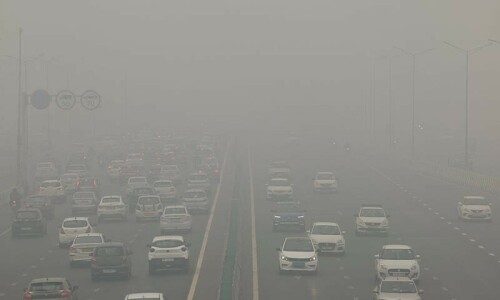BEIRUT: Russian-backed Syrian forces have gained ground after a week-long renewed assault against the last opposition enclave in Syria’s northwest, the biggest such push in more than three months that has prompted a large civilian exodus, witnesses and residents said on Sunday.
The wide-scale offensive led by intense aerial strikes on civilian areas in rural southeastern Idlib province broke months of stalemate on the frontlines, where rebels had been holding back the army from major advances, they said.
Russian and Syrian jets have stepped up strikes on villages and towns around Maarat al-Numan, from which thousands of people have fled to the relative safety of the Turkish border fearing an imminent assault.
Russian jets hit a convoy of civilian cars fleeing the city, according to activists who posted videos online showing several charred bodies. Rescuers said at least eight people were killed, including three women and two children.
On Saturday, Russian jets hit a busy marketplace in Saraqeb city, east of Idlib, leaving at least eight dead and scores injured, two residents and one rescuer said.
There was no immediate comment from the Russian military.
Russia and the Syrian army, which is loyal to President Bashar al-Assad, both deny allegations of indiscriminate bombing of civilian areas and say they are fighting Al Qaeda-inspired Islamist militants.
The Syrian army said it had gained more than 20 villages and hilltops and was coming close to one of 12 Turkish observation posts in the northwest, part of a deal with Moscow and Tehran in 2017 to avert large-scale fighting in Adlib.
Residents in the area said many villages were now deserted in a campaign that, since it first started in April, has displaced more than 500,000 people, according to the United Nations and international relief groups.
“Many villages and towns have turned into ghost towns. Russia’s ‘scorched earth’ bombing is helping the army gain ground,” said Mohamad Rasheed, an activist from the area said.
In the past week alone, at least 80,000 civilians fled and face harsh conditions during the start of winter, said the Union of Medical Care and Relief Organisations (UOSSM), a US-based medical NGO.
Medical facilities, already crippled by a year of attacks, are struggling to deal with the influx of wounded, it said. At least 68 medical facilities have been attacked since April, the NGO and other UN agencies have documented.
Western military sources said the latest bombardment was a prelude to a widescale ground offensive to take over rebel-held Idlib province.
The Idlib region is home to hundreds of thousands of people who fled other parts of Syria as government forces wrested back large areas of the country following Russian intervention on Assad’s side in early 2015 that tipped the war in his favour.
Published in Dawn, December 23rd, 2019
















































Dear visitor, the comments section is undergoing an overhaul and will return soon.